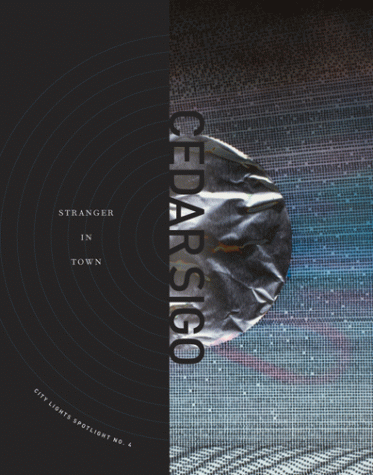

Reviewed January 20, 2012 by Adam Bishop.
Moving through Cedar Sigo’s second book, Stranger in Town, is akin to visiting a historic hotel; things are visible only in part, obstructed not by cloud or landscape but by collective, perplexing memory and expectation. The scattered lights from occupied rooms stand as testament to the presence of other lives. The penthouse balconies are high and remote. The revolving door is at once inviting and ominously charged. Everything is filled with history, function, and meaning. Stranger in Town is a mosaic of macrocosmic fragments, each deployed with austerity. Like the old building, there are rooms to be explored; there is the physicality of place, and then the relationships we experience therein. Patches of granite surface and square lit windows are both the backdrop, the set, and sometimes the subject. Sigo writes, “one must keep holy/the edges of fragments/slots used/clothes loose.”
Elsewhere, Sigo has claimed for himself the lineage of both the Black Mountain and San Francisco Renaissance poets—the spirituality and openness of Duncan and Wieners. Such a lineage is everywhere on display here, specifically in the ability of his referential and imaged-based poems to simultaneously embrace the ineffable. I also can’t help but think of William Corbett or James Schuyler:
Through the urban settings and literary landscapes of Stranger in Town, Sigo weaves a wayfaring identity, one where his notions about self and surroundings give the reader a sense of a narrator who is intimately in tune with his audience without getting sappy or confessional about it (“I am sorry I said/he was/already high/We got so high together”).
Although he claims to be unconcerned with content, the way Sigo’s work melds various perspectives and possible interpretations, it is hard to believe that content is second rate to the poet. In an interview for the Poetry Foundation, he states that he doesn’t like “filing down the line too much.” I believe that it is this refusal to whittle poetry into a single, authoritative meaning, into something to be interpreted, or decoded that enchants Sigo’s work; there’s something almost mystical here. This is not to say that Stranger in Town is a bunch of distracting spiritualist hubbub; rather, it’s Sigo’s non-linearity, his choices in imagery and personal reference that anchor his work, keeping the reader from blowing away into some sort of spiritualistic catatonia.
Sigo references places and people as signals and symbols, beacons of a broader potential engagement. Although this risks creating a poetry that is overly obtuse or scattered, Sigo deftly circumvents this by exposing his readers to poignantly fragmented moments, moments where the twin burdens of identity and memory are clearly active and displayed, even if their context remains somewhat cloudy. The poems “Seriously Underdressed” and “Stranger in Town” are rife with images that enact a nervous tension, but also resound with a kind of sincerity or honesty, as though the poet knows his audience is receptive. With lines like “bitten down/Fingernails,” “other lost men,” and “I am punished to this day,” Sigo conveys anxious tensions by capturing the unease of being underdressed, of lacking familiarity with people and objects that are distant or lost (“Locket is still/Missing & I miss/Wearing it open”). Sigo is able to unfold larger issues of identity, memory, and companionship without resorting to overly-explanatory narrative.
If one doesn’t grasp what Sigo is doing here, he offers guidance with prose-like rhetoric in “The Sun” or “The Emerald Tablet,” where he explains, “one of my primary concerns in poetry has become the courtship, recognition, and handling of physical tension. Does it die down along the furnished room or become changed by it?” Effectively placed throughout Stranger in Town, this tension never forces the work into an unanswerable melodrama; rather, it is handled as a tool, shaping edges and grooves, then ultimately buffing this intimate, referential work into an accessible book of poetry—one reaching out to readers in personable lines (“All I see/in the mirror every morning/is a face that needs washing”).
Like that old hotel, Stranger in Town is infused with a sense of hospitality. It is a place that can—and should—be returned to, a place meant for fellow travelers, for strangers. Sigo offers us some familiar comforts along the way in the form of cultural figures that appear throughout the book. Here, we find, for example, the poet John Wieners, the actress Joan Crawford, and the dancer Valsav Nijinsky. Thus, Sigo both curates and continues a cultural conversation. In “Notes on Joan Crawford,” he demystifies the actress, offering a delineation of her life and career through effectively paced line breaks. This attention to mise-en-page seems characteristic of Sigo’s work. At times, one can see the effect of enjambment; an image or idea can be drawn from each line, yet they also somehow connected to what follows:
And other times, as in “$$$Expensive Magic$$$,” it seems like Sigo’s words are merely suspended within the emptiness of a page. They stand together, floating, alluringly visual. It is this care for form and regulated tension that carries me through Stranger in Town. I feel that Sigo writes honestly, never giving us too much. He trusts his readers not to fall prey to some sort of knee-jerk need for steadfast clarity. Instead, his poems abound with intrigue. It is as if Stranger in Town, like the old hotel, has an enigmatic past, rooms with a cloaked history, and a distinguished guest-list written only in memory; we keep reading to better know the hotel.
***
Adam Bishop grew up in San Diego and lives in Boulder, where he’s completing an MFA at the University of Colorado.